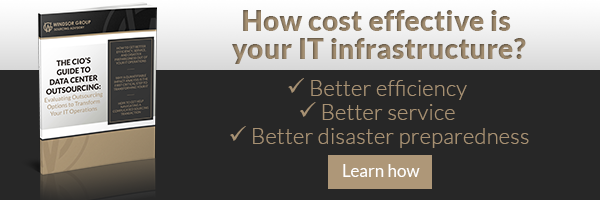
Psychologically, there’s an inherent sense of control and security that comes from owning and operating your own data center. Obviously the biggest advantage is one of convenience. This is your data center, it is at your beck and call, and its sole purpose is to do one thing and one thing alone; service your corporate needs. But as valuable and necessary as data centers are to any business, there’s still the issue of the numbers at work. At the end of the day, the benefits of owning and operating a data center must outweigh the risks and inconveniences. Here are a few of the potential hazards that every data center operator must face in order to remain effective.
Planned Obsolescence
As with any technology, the moment you commit to building and maintaining a data center, you are “locking yourself in” to the technology that is available at that time. The cost of equipment acquisition is enormous, and the interconnected nature of the data center makes it unlikely that you will be able to replace, in piecemeal fashion, parts of the data center infrastructure that prove to be outdated as your needs change and grow.
On the one hand, it’s financially irresponsible to simply buy the most powerful hardware around in case you’ll need that power someday. And, it’s not cost efficient to commit to a data center that addresses only your present needs and may be unable to adjust to your future growth, requiring an even larger expenditure.
Inefficiency
A data center is a tremendous collection of energy-hungry technology. As a result, an inevitable consequence is heat generation, and the associated risks that come with it. To combat this and maintain functionality, a lot of energy and maintenance has to be devoted to heat management, especially for escalating activity like cloud-related functions. Cooling, back up battery losses, voltage conversion, and general maintenance costs all add up, and in some cases, the cost effectiveness ratio of power consumption and maintenance actually outweighs the actual usefulness of the facility.
Compliance Costs
Depending on the type of data handled, there may be certain costs associated with maintaining compliance with government and/or industry regulations. Insurance companies, for example, must not only safeguard private patient data for healthcare-related financials, they must also ensure that data handling and storage meets the Health Insurance Portability & Accountability Act. This is an additional layer of labor and cost on top of the already sizable investment in the technology and its maintenance.
There’s no question that data centers are vital to the continued operation of many sizable companies. The bigger question is whether it makes financial sense for companies to shoulder the financial burden and risks of maintaining these data centers themselves. A consultation with IT sourcing advisors can help you determine where your needs (and solutions) lie.


